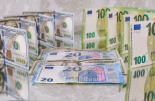Monex: Dollar daalt en risicobereidheid neemt toe door akkoord stimuleringsmaatregelen VS
Monex: Dollar daalt en risicobereidheid neemt toe door akkoord stimuleringsmaatregelen VS

Hieronder volgt een commentaar in het Engels van Ranko Berich, Head of Research bij Monex Europe op de Amerikaanse dollar, euro en het Britse pond.
USD
After showing tentative signs of weakness yesterday morning, the dollar began a true retreat late yesterday evening and continued this morning, helped along by the news that the US Senate had reached a fiscal stimulus deal worth almost $2 trillion. The core of the bill will be a package of “helicopter money”, or direct cash payments to citizens, but corporate bail-outs will also be financed. Senate leader Chuck Schumer said that bailed out airlines would be prevented from conducting stock buy-backs or issuing bonuses to chief executives. Although the bill has yet to be released and formally clear the Senate and the House of Representatives, for now, the prospects of success look good. House leader Nancy Pelosi spoke favourably of the deal in a television interview in the afternoon and said that Republicans had accepted demands for greater oversight of the $500bn fund for business bailouts. The market reaction to the news was positive on the whole, with US equities enjoying their biggest rally in more than a decade. Indices tracking both high yield and municipal debt rallied, suggesting some of the stress in financial conditions may be beginning to abate. However, several important credit spread measures continued to widen. The most important question now is how long this nascent rally in markets and reprieve in US dollar strength can last; with news flow regarding the US fiscal stimulus bill and the virus itself likely to be in focus for the rest of this week. As expected, US survey data released yesterday was dismal, and pointed towards a severe economic contraction: purchasing managers indices from Markit and ISM both plunged to recessionary levels.
EUR
The euro was boosted again yesterday by signs that the German government is willing to loosen the purse strings should the economic toll of the coronavirus put the economy into a deep recession. The measures could involve consumer spending and corporate tax relief, though a broad distribution of funds isn’t on the table like that seen in the US. This adds to Monday’s aid package that totalled more than €750bn, which mostly focused on loans and guarantees to help stricken businesses. When asked, German Economy Minister Peter Altmaier said he was presented with a range of proposals beyond the government’s €750bn rescue package. Increasing fiscal support in the eurozone has benefited the single currency this week, which has also been aided by a softening US dollar as the Fed’s international swap lines begin to take some of the strain off of the dollar. This was evident in the ECB’s auction to seven European banks yesterday, who secured $4.1bn in 7-day operations compared to just $20m on Monday. Today all eyes are turned to the German IFO Business Climate Index that will be released at 09:00 GMT. Though yesterday’s grim PMI data from Germany, France and the eurozone did not startle the euro, today’s release may be of more significance, as the IFO not only queries firms to assess their current business situation but also their six month business outlook, revealing how severe firms are pricing in the duration of the global pandemic.
GBP
Sterling brushed aside all bad news yesterday and began swimming back to the surface after GBPUSD plumbed to depths not seen since the 80’s last week. Shocking preliminary PMI data for March along with news that the country would now be placed under a three-week lockdown did little to shake sterling’s optimism as the currency pounced on the weakening dollar. GBPUSD has rallied nearly 3 percentage points this week so far. Reprieve in USD liquidity demand in the UK financial system also came from the Bank of England as $3.6bn was taken up in the central banks' swap auction, up from a measly $5m on Monday. The premia in cross-currency swap markets fell sharply should investors wish to exchange cash flow in pounds to dollars, which was a major concern last week for major currencies such as the pound, yen and euro. While this by no means stimulated sterling’s rally, it substantially contributed to the pound’s resurgence as the price of dollar demand eased across the board. Yesterday’s composite PMI reading fell to 37.1 in March from 53.0 in February, far below the consensus of 45.0. The main catalyst in the underperformance came from the service sector, whose preliminary PMI fell to 35.7 from 53.2 previously, while the drop in manufacturing activity was much less at 48.0 from 51.7 in February. The drop in the composite PMI was more than three times its previous record decline, showing that the economy is rapidly firing into a recession. IHS Markit predicts that the fall in the composite reading is consistent with a quarterly contraction of 1.5-2%, while Pantheon economists predict the economic impact would be larger than 2% in Q2 given the containment measures recently announced. This morning’s CPI data saw inflation drop to 1.7% YoY from 1.8% in January. The lagged February data is of little interest to markets, however, as the March figures and beyond are likely to be substantially worse.





